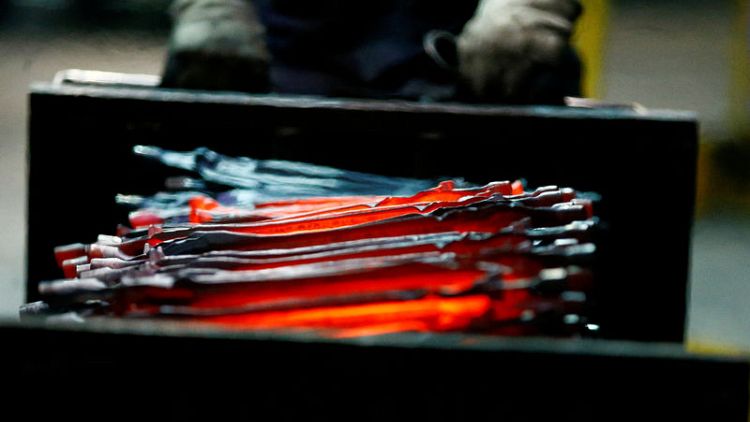By Jonathan Cable
LONDON (Reuters) - Growth in euro zone factory activity was minimal in January as new orders fell at the fastest rate in nearly six years, suggesting manufacturers are acting as a drag on the economy, a survey showed on Friday.
Some of that scant growth was from factories running down backlogs of orders for a fifth month while having to stockpile finished products at the fastest rate since the survey began in June 1997.
The slowdown comes just weeks after the European Central Bank shuttered its more than 2.6 trillion euro asset purchase programme and will fuel expectations a global economic slowdown is underway, as highlighted in a Reuters poll last month. [ECILT/WRAP]
IHS Markit's January final manufacturing Purchasing Managers' Index fell for a sixth month, coming in at 50.5 from December's 51.4, matching a flash reading but barely above the 50 level separating growth from contraction.
That was its lowest reading since November 2014 and an index measuring output which feeds into a composite PMI due on Tuesday - seen as a good gauge of economic health - fell to a 5-1/2 year low of 50.5 from 51.0.
Protests in France, an auto sector struggling to regain momentum, political uncertainty and rising trade protectionism were all cited by managers as reasons for the slowdown, IHS Markit said.
"The January PMI adds to the likelihood that the manufacturing sector is in recession and will act as a drag on the economy in the first quarter," said Chris Williamson, chief business economist at IHS Markit.
"Worryingly, weaker than anticipated sales mean warehouses are filling up with unsold stock ... suggesting firms will need to cut operating capacity in coming months unless demand revives, boding ill for future production growth."
An index measuring stocks of finished goods jumped to a survey high of 51.5 from 50.7. Other forward looking indicators showed factories reduced purchases of raw materials for a second month and cut back on hiring.
"Any such downturn in the labour market will in turn potentially drive consumer sentiment lower, and adds further to the risk that economic growth will continue to slow in coming months," Williamson said.
(Editing by Toby Chopra)



